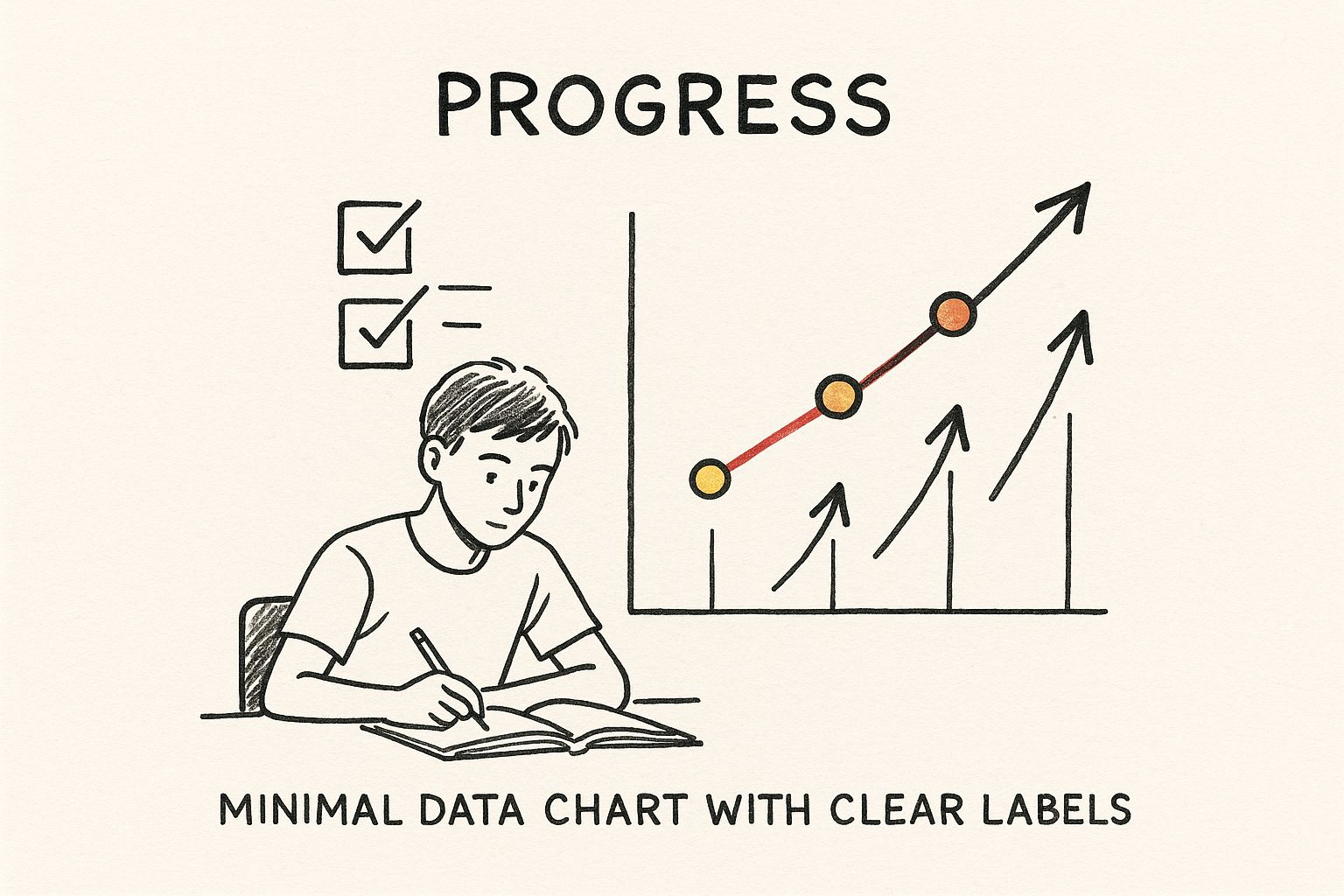Let’s be honest: telling a teen to "set goals" can feel like just another thing to add to their already-packed list of responsibilities. We hand them worksheets and expect them to map out their entire future, but this rigid, old-school approach often backfires. Instead of inspiring them, it can become a huge source of anxiety.
Why Traditional Goal Setting Can Backfire
Think about it from their perspective. Juggling school, a social life, and figuring out who you are is overwhelming enough. Adding long-term, high-stakes goals to the mix can feel completely out of reach. The teenage brain is wired differently when it comes to planning and failure, which turns the pressure to achieve into a recipe for stress.
This is especially true for teen boys, who often feel the weight of expectation without feeling like they can show any vulnerability. The whole conversation needs to shift—away from hitting rigid targets and toward building real confidence and self-awareness.
The Pressure of Perfection
The classic goal-setting model suggests a straight line from point A to point B. It leaves zero room for error, which is a huge problem. This creates a paralyzing fear of failure, and what happens next? Procrastination.
When a teen sets a goal like "get an A in math," any grade that falls short can feel like a complete disaster. It's an all-or-nothing mindset that makes them want to give up entirely.
This ignores the messy, beautiful reality of learning. Most teens are still exploring what they’re good at and what they even like. That requires experimentation, and yes, a few screw-ups along the way. A better approach is to use strategies for periodic reviews, which helps them check in, see what’s working, and adjust their plans without feeling like they've failed.
When Motivation and School Don't Align
The wild thing is, most teens are trying to set goals. A 2013 study found that 75.4% of teens set goals for themselves, and for 41.8% of them, school was a top priority. Yet, a massive 81% admitted they failed to reach an important goal.
The study also pointed out that most were still using old-school methods like notebooks instead of tools that might actually help them stay on track. This huge gap between wanting to achieve and actually doing it shows that just saying "set a goal" is useless advice. The goals have to feel personal, relevant, and flexible.
The real win isn’t the final grade or the trophy. It's building skills like resilience, problem-solving, and adaptability. Those are the tools that will stick with them for life, long after a specific goal is met or missed.
For parents, this is a call to create a home where effort is praised more than perfect outcomes. It’s about building a supportive space where it’s okay to stumble. This is also where things like moderated men's groups or mentorship programs can be game-changers, offering a place for young men to talk openly about pressure and redefine what success really means to them.
Connecting Schoolwork to Real-World Interests
Let’s be honest, the classic “get good grades” speech rarely works. It often feels like a vague, disconnected demand. The real key is helping your teen see school not just as a bunch of required classes, but as a training ground for things they actually care about.
It all starts with a simple conversation. What are they really into? Video game design? Social justice? Maybe they love tinkering with cars.
Once you know that, you can start drawing lines. Suddenly, algebra isn't just a bunch of numbers—it's the coding language behind their favorite game. A history project isn't about memorizing dates; it's about understanding the world they live in right now. That's when schoolwork starts to click.
From Big Dreams to Small Wins
Thinking about getting into a top college or launching a successful YouTube channel can feel completely overwhelming from the starting line. The secret is to help your teen chop those massive goals into tiny, confidence-boosting wins. Forget the finish line for a minute and just focus on the very next step.
- For the aspiring entrepreneur: Don't get bogged down in writing a business plan. The first step? Just research one person who’s already successful in that field. That’s it. Learn their story.
- For the future college student: The application can wait. The next step could be as simple as taking one virtual campus tour or listing three extracurriculars they genuinely enjoy.
- For the creative artist: Instead of a full portfolio, what about one sketch? Or one page of a story? Just for this week.
To help them see the bigger picture without the pressure, creating a personal career development plan can be a great way to map things out. It shifts the focus from a mountain of pressure to a series of manageable steps.

This is all about building momentum. By checking off one small item at a time, the bigger goal starts to feel way more achievable.
Navigating Different Paths and Realities
It’s so important to remember that the path after high school isn't a one-size-fits-all journey. Not everyone is headed for a four-year university, and that's perfectly okay. Realities like family finances, personal interests, and even gender can play a huge role in what comes next.
A Pew Research Center study found that while 53% of teens planned to attend a four-year college, that number changed depending on who you asked. Sixty percent of girls aimed for a four-year degree, compared to just 46% of boys.
Household income was an even bigger factor.
Teen Post-High School Plans by Household Income
This table from Pew Research Center data shows just how much household income can influence a teen's plan to attend a four-year college.
| Household Income | Plan to Attend Four-Year College | Other Plans (2-year, trade, work, etc.) |
|---|---|---|
| Over $75,000 | 63% | 37% |
| $30,000 – $74,999 | 52% | 48% |
| Under $30,000 | 23% | 77% |
The data makes it clear: generic advice just doesn't cut it. The gap between 63% of teens from higher-income homes and only 23% from lower-income homes planning for a four-year degree is significant.
Your role as a parent isn't to force a rigid five-year plan. It’s to be a supportive co-pilot. Help them explore all the routes—college, trade school, the military, starting a business—and focus on building skills that will serve them no matter which path they take.
When it comes to supporting goals for teens, especially for young men who might feel pressure to follow a specific script, validation is key. Encourage them to talk to people in different fields. Have them volunteer or try a free online course. This builds resilience and the ability to adapt—skills that are far more valuable than any predetermined plan.
Prioritizing Mental Health and Personal Growth

Meaningful goals for teens have to be about more than just report cards and college applications. Personal growth—like learning to manage stress or building real emotional resilience—is just as critical for a happy, successful life. It's time to start seeing well-being as a core measure of success.
This is especially true for teen boys who are struggling. They often feel this immense pressure to appear strong and tough it out, which can make talking about mental health feel impossible. When we frame emotional wellness as a strength, not a weakness, it changes everything.
A Meditation Guide for a Busy Teen Mind
Meditation doesn't have to be some complicated, mystical thing. It’s really just about taking a few minutes to quiet the noise. For teens juggling academic and social pressures, it's a powerful tool. A lot of procrastination and motivation slumps actually come from anxiety, and a quick mental reset can break that cycle.
Here's a simple, no-fuss way for any teen to get started:
- Find a Quiet Spot: It doesn’t have to be silent, just a place you won’t be interrupted for five minutes. Your bedroom, the backyard, even a parked car works.
- Get Comfortable: Sit in a chair with your feet on the floor, or lie down. Don't worry about the perfect yoga pose; just be comfortable.
- Just Breathe: Close your eyes and bring your attention to your breath. Don't try to change it. Just notice the feeling of air moving in and out of your body.
- Acknowledge Your Thoughts: Your mind is going to wander. That's what minds do. When a thought pops up, just notice it without judgment and gently bring your focus back to your breath.
- Start Small: Seriously, just try it for three to five minutes. Doing it consistently is way more important than how long you do it. Even a few minutes a day can lower stress and boost focus for school.
The goal of meditation isn't to silence your thoughts; it's to learn how to not be controlled by them. This simple practice builds emotional regulation skills that are essential for navigating challenges.
Building Resilience with Strong Support Systems
For young men, finding spaces where they can be open without judgment is a game-changer. Those old-school expectations of what it means to be a man can leave them feeling isolated, which directly messes with their ability to set and chase their goals. This is where things like moderated men's groups can offer incredible support.
These groups provide a community where teen boys can talk about pressures, learn healthy ways to cope, and connect with positive role models. It helps them build an emotional toolkit that will serve them long after they've left school.
Curated Mental Health Resources
Knowing where to turn for help is a huge first step. Research from the National Institute of Mental Health shows that getting support early is key to long-term well-being. Here are a few trusted resources designed specifically for teens and young adults:
- The Jed Foundation (JED): This organization has incredible resources for teens, young adults, and parents. They're all about protecting emotional health and preventing suicide, and their site is full of practical tips.
- Boys Town National Hotline: This free hotline is open 24/7, offering counseling and support for teens and families dealing with anything from school stress to family conflict.
- Calm and Headspace: These apps are a fantastic starting point. They offer guided meditations, sleep stories, and mindfulness exercises designed for total beginners, making it easy to build mental wellness into a daily routine.
As a parent, your job is to open the door to these conversations and resources. When you normalize mental health support, you help your teen see it as a proactive step toward building a strong, fulfilling future. That's what empowers them to tackle their goals with real confidence and clarity.
Navigating Procrastination and Motivation Blocks

Telling a teen to "just do it" when they're stuck is like telling someone who's lost to "just get there." It's not helpful. Procrastination isn't about laziness; it’s usually a complicated emotional response to stress, a deep-seated fear of failure, or just feeling completely buried by the size of a task.
Nagging never works because it completely misses the point. It doesn't address the why behind the inaction.
Think about a teen putting off studying for a big final. It's almost never because they don't care about their grade. It’s because the goal—"ace this exam"—feels so massive that they don’t even know where to start. That paralysis leads straight to avoidance. This is especially true for teen boys who are struggling, as the pressure to have it all figured out can make it tough to admit they're overwhelmed.
Small Steps to Overcome Inertia
The trick is to make the first step so ridiculously easy that it’s almost impossible not to do it. This is how you break the cycle of anxiety and inaction. The point isn't to conquer the whole mountain in one go, but simply to take that first step.
Here are a couple of simple but incredibly powerful techniques I use with teens:
- The 5-Minute Rule: Just commit to working on the task for five minutes. That’s it. Anyone can do something for five minutes. What’s amazing is that this tiny investment is often all it takes to build a little momentum and keep the ball rolling.
- Micro-Steps: This is about breaking an intimidating goal into laughably small pieces. "Write a 10-page research paper" is terrifying. But "open a new Google Doc and write one sentence about the topic"? Totally achievable. The next step might be "find one source," and then "read just the introduction of that source."
By focusing on these tiny actions, the brain shifts from a threat response ("I can't do this!") to a sense of accomplishment ("I did something!"). That little win builds the confidence and motivation to do the next small thing. To really tackle procrastination head-on, teens can also explore strategies to focus better and learn how to reclaim their attention from all the noise.
Fostering Genuine, Lasting Motivation
Motivation really comes in two flavors: extrinsic (driven by outside rewards like good grades or money) and intrinsic (driven by internal satisfaction and curiosity). While external rewards have their place, relying on them too much can seriously backfire. True, lasting drive—the kind that gets you through the hard stuff—comes from within.
Helping a teen connect their goals to their own values and interests is the most powerful motivator there is. When they see the 'why' behind the work, the 'how' becomes much easier to manage.
This is a huge part of setting meaningful goals for teens. Instead of asking, "What do you need to get done?" try a different approach. Ask, "What part of this is even remotely interesting to you?" or "How will getting this done help you get closer to something you really want?"
For parents looking to go deeper, understanding how to motivate teenagers can provide a practical roadmap. It helps shift the dynamic from a constant power struggle to a genuine partnership, creating an environment where they feel supported in finding their own reasons to succeed.
Ultimately, that internal drive is what will carry them through challenges long after the grades are in and the external pressures are gone.
Building a Real Support System
There’s an unspoken rule among teenage guys: "tough it out" and handle your problems alone. This pressure is a huge barrier when it comes to setting and hitting meaningful goals for teens. You can't build real resilience if you're trying to do everything solo.
Putting together a solid support system isn’t a sign of weakness. It's actually one of the smartest, strongest things a young man can do to build genuine confidence.
For parents, this means being proactive. It's about finding safe spaces where your son can actually talk about what's going on without feeling judged. This kind of support, often found outside the immediate family, is crucial for helping him navigate school, stay motivated, and figure out who he is.
Finding the Right Crew and Mentors
The right environment can change everything for a teen who feels stuck. It’s about finding people and places that model a healthy, positive version of what it means to be a man—something that isn't always easy to find in the usual school or sports circles.
A few places to look:
- Moderated Men's Groups: Some organizations, like The ManKind Project, or even local community centers, have programs specifically for young men. These aren't just hangouts; they're structured groups where guys can talk about real pressures and learn from positive role models.
- Mentorship Programs: A good mentor can be a game-changer. This could be a coach, a family friend, or someone in a field your son looks up to. Having that one-on-one guidance from someone who's been there can make all the difference when he's battling procrastination or feeling like giving up.
A strong community shows a young man that his struggles are valid and that asking for help is a sign of strength, not weakness. That emotional security is the foundation he needs to set bigger goals and bounce back when things get tough.
Practical Tools for Real-World Problems
Support isn't just about feelings; it's also about giving your son practical tools he can actually use. For a lot of teens, not knowing what they want to do after high school is a massive source of stress. One OECD report even found that teens' career plans are often shaped more by their background than by their actual skills, which just adds to the anxiety.
When you provide clear guidance, you can relieve a lot of that pressure.
It’s the same with procrastination. Nagging him to get his homework done won't work. What he really needs are skills. He needs to learn how to break huge projects into smaller, manageable pieces and how to organize his time so he doesn't feel constantly overwhelmed.
Our guide on teens and time management is packed with strategies to help him get a handle on his schedule. When a teen feels like he's in control of his daily life, he's in a much better position to go after his bigger goals with focus and drive.
Answering Your Top Goal Setting Questions
Guiding a teen through setting goals can feel like a maze, even when you have the best intentions. You want to be supportive without micromanaging, encouraging without adding pressure. It's a delicate balance.
Let's walk through some of the most common challenges I see parents face when helping their teens find and chase meaningful goals.
How Can I Help If They Have No Idea What They Want?
First off, it's completely normal for a teen not to have a grand life plan. The pressure to choose a lifelong passion can be paralyzing. For a lot of kids, it leads straight to procrastination and a total motivation shutdown.
Instead of hitting them with the classic, "What do you want to be?" try shifting the conversation. Ask something like, "What problems do you find interesting?" or "What's something you'd like to be able to do?" This simple change reframes the whole idea from a massive, terrifying identity choice to a small, exploratory action.
Encourage tiny, low-stakes goals to get the ball rolling:
- Complete a one-hour online course on a totally random topic.
- Volunteer for a single weekend event.
- Learn a practical skill, like how to cook one great meal or change a tire.
The point isn't to find their destiny overnight. It's to build a library of experiences that starts to reveal their strengths and interests. The bigger goals will feel a lot more natural later on.
What If My Teen's Goals Seem Totally Unrealistic?
When your teen announces they want to be a professional gamer or a millionaire by 25, your first instinct might be to protect them from failure. You see the flaws in the plan, the long odds. But resist that urge. Shutting down a big idea can crush their motivation and, just as importantly, damage their trust in you.
Instead, step into the role of project manager.
Try saying something like, "That's a huge ambition, and I love that you're thinking big. Let's map out what it would actually take to get there." This positions you as an ally, not an obstacle.
Help them research the steps, the skills they'll need, and the hurdles they'll likely face. This process is a masterclass in critical thinking, planning, and problem-solving. More often than not, they’ll adjust their timeline or the goal itself once they see the full picture—all without feeling like you dismissed their dream.
If you're looking for a solid framework for these conversations, a great starting point is learning how to set SMART goals and adapting it to your teen's big ideas.
How Should I React When My Teen Fails?
This is a big one. Failure isn't a disaster; it’s data. And how you react in this moment is absolutely critical for building resilience. The first thing to do? Just validate their feelings.
Acknowledge their disappointment with a simple, "I know you're bummed about this, and that's completely understandable." That's it. This creates a safe space for them to process the setback without shame. For teen boys especially, who often feel they can't show vulnerability, this validation is huge.
Once they seem ready, you can guide a gentle post-mortem. Ask questions that are all about learning, not blame:
- "What was the toughest part of this process for you?"
- "What did you learn from trying this?"
- "If you were to do it again, what's one thing you might do differently?"
This approach reframes failure as a necessary and valuable part of the journey. It teaches them that the real win isn't always achieving the goal, but becoming stronger and smarter along the way. Supporting them through this builds the resilience they need for all future goals for teens.
At Andrew Petrillo Life Coaching, we specialize in helping teens and young adults turn overwhelm into actionable, meaningful goals. If your teen is struggling with motivation, procrastination, or finding their direction, a personalized coaching plan can make all the difference. Learn how we can support your family by visiting https://andrewpetrillolifecoaching.com.



















